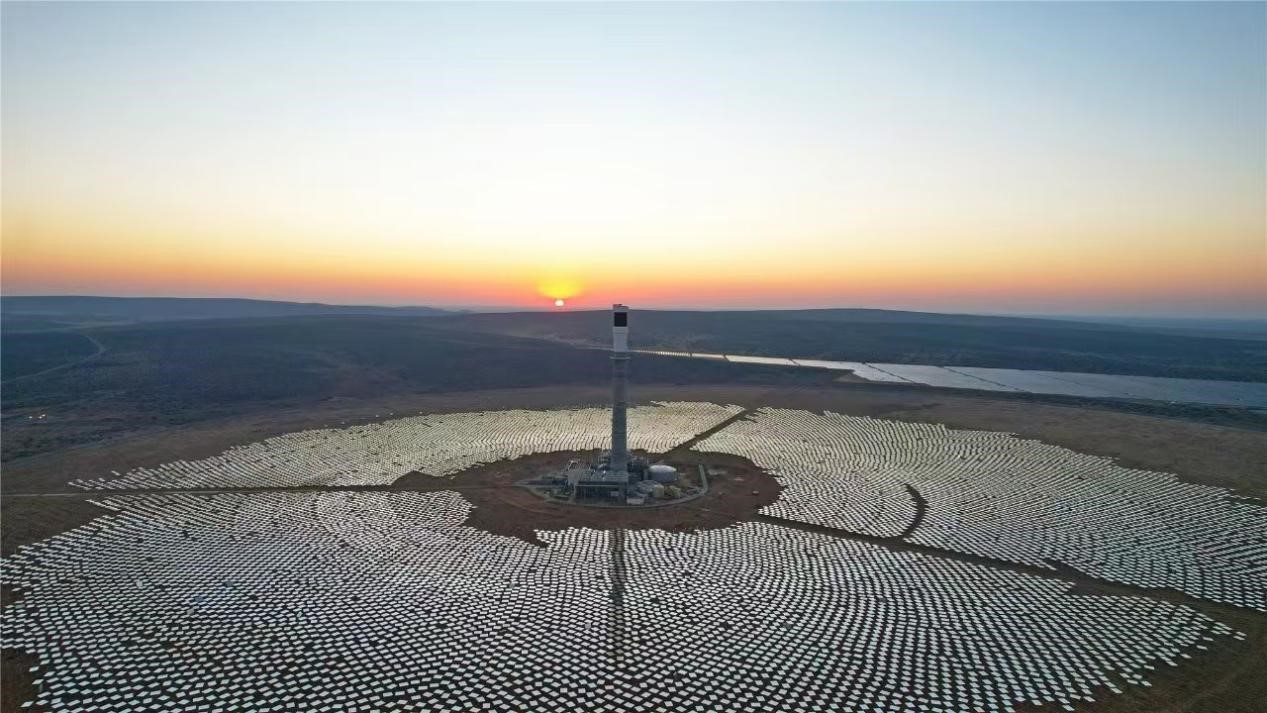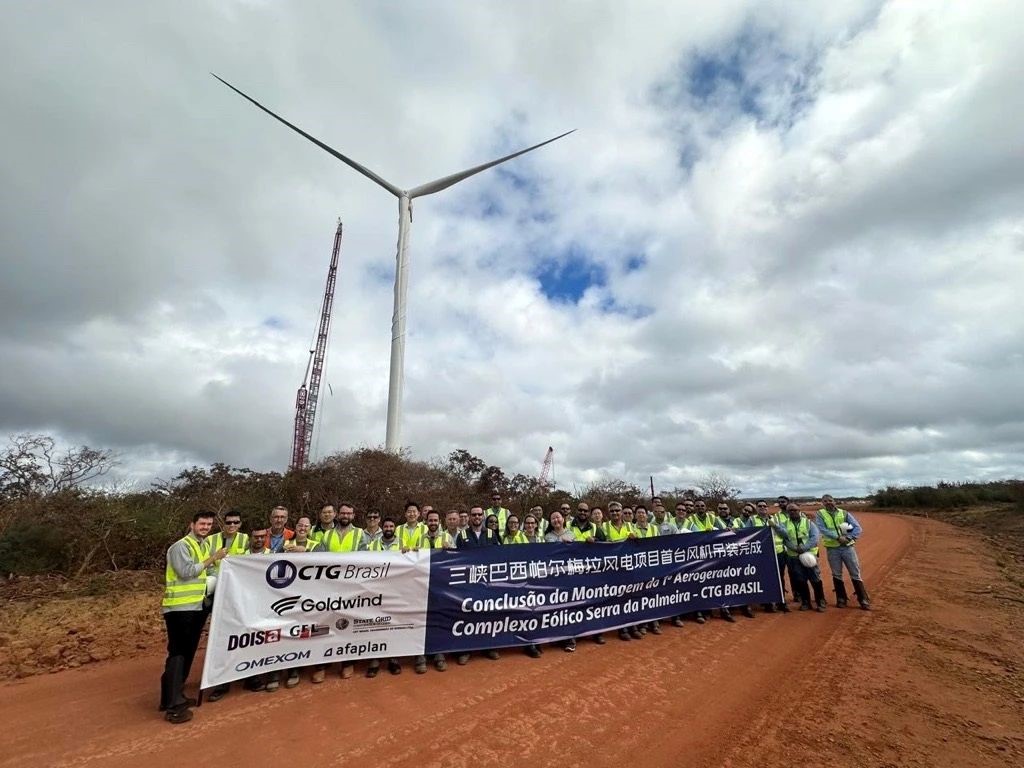BRICS countries join hands to promote green, low-carbon development
In the town of Postmasburg in Northern Cape Province of South Africa, where there are abundant sunshine and vast land, the Chinese-built 100-megawatt (MW) Redstone Concentrated Solar Thermal Power (CSP) Project resembles a giant sunflower, harnessing the sun's light and heat.
The project, known as South Africa's largest renewable energy project, was successfully connected to the country's power grid in mid-September this year, marking the beginning of a crucial phase in the construction of the project.
Once fully operational, the project is expected to contribute approximately 480 gigawatt-hours (GWh) of clean electricity to South Africa's power grid annually, meeting the electricity needs of over 200,000 households.

Photo shows the Chinese-built 100 MW Redstone Concentrated Solar Thermal Power Project in Northern Cape Province of South Africa. (Photo provided by SEPCOIII Electric Power Construction Corporation)
While helping alleviate local electricity shortages, the project will also reduce South Africa's reliance on traditional fossil fuels.
In the desert on the outskirts of João Câmara, a city in the northeastern Brazilian state of Rio Grande do Norte, State Grid Brazil Holding, a subsidiary of the State Grid Corporation of China, created an oasis of renewable energy - the Gameleira Wind Complex.
The wind power project generates around 360 million kilowatt-hours (kWh) of clean electricity per year, equivalent to saving 129,600 tonnes of standard coal and reducing carbon dioxide emissions by 358,900 tonnes. It has also created over 2,000 job opportunities for the local people.
In recent years, BRICS countries have actively carried out cooperation in green energy development, fully utilizing the unique renewable energy resources of each country, such as solar and wind power, to promote the implementation of clean energy projects, injecting "green power" into the efforts to boost development and improve people's livelihood.
China has been continuously advancing energy transformation, effectively reducing the technological costs of clean energy cooperation among BRICS countries.
In recent years, China has accelerated the construction of a clean, low-carbon, safe and efficient energy system, and made significant progress in coordinated pollution reduction and carbon mitigation.
So far, China has established the world's largest carbon emissions trading market, covering an annual carbon dioxide emissions volume exceeding 5 billion tonnes.
The country has also vigorously promoted the development of renewable energy, ranking first globally in terms of the installed capacity of hydropower, photovoltaic, and wind power.
Cooperation among BRICS countries in energy transformation and green, low-carbon initiatives is becoming increasingly close, resulting in the emergence of a good number of exemplary cooperative projects, including the Health Facility Solar Electrification initiative in Ethiopia and the supply of 96 subway cars to the Brazilian city of Belo Horizonte.
The "BRICS Industrial Cooperation Casebook", a document released at the BRICS Forum on Partnership on New Industrial Revolution 2024 held in Xiamen, southeast China's Fujian province in September this year, reveals a multitude of exemplary cooperative projects among BRICS countries in new industrial revolution in recent years, covering energy transformation and green, low-carbon initiatives.

Chinese and Brazilian workers celebrate the completion of the successful hoisting of the first wind turbine at the construction site of the Serra da Palmeira Wind Complex in the state of Paraiba, Brazil, July 24, 2024. (Photo from the WeChat official account of the CTG Brasil)
The "International Cooperation Initiative on New Industrialization" launched during the forum proposes that BRICS countries expand pragmatic cooperation in industries such as photovoltaic power generation, wind power equipment, and new energy vehicles, to accelerate the green transformation of industries.
Funeka Yazini April, coordinator of the BRICS Research Center at Human Science Research Council, Pretoria, South Africa, believes that the efforts of BRICS countries to enhance cooperation in green energy development, utilization, and technological innovation, and accelerate green and low-carbon transformation hold significant importance for promoting both their own and global sustainable development.
As the global challenges brought about by climate change intensify, developing countries have become the principal victims of climate change issues.
The BRICS countries have always been concerned about the common future of humanity and have emerged as a crucial force in addressing climate change.
The BRICS countries have initiated the BRICS cooperation to jointly tackle the challenges posed by climate change.
At the 14th BRICS Trade Ministers Meeting held in July this year, relevant parties adopted the Joint Communique of the 14th BRICS Trade Ministers Meeting and the "BRICS Statement on Environmental and Climate-related Trade Measures", emphasizing opposition to unilateralism and green protectionism.
During the meeting, relevant parties reached consensus on enhancing exchanges in green technologies and promoting cooperation on standards for green products, and agreed to compile standards and best practice cases related to green products, which laid a crucial foundation for further strengthening the alignment of standards and cooperation on new energy vehicles, lithium batteries, solar panels, and other products among BRICS countries.
In September this year, the New Development Bank (NBD) and nine other multilateral development banks announced that their global climate finance reached a record high of $125 billion in 2023.
The NBD's previously released 2022-2026 General Strategy indicates that over the next five years, the bank would provide $30 billion in funding support to member countries, with 40 percent of the funds allocated for climate change mitigation efforts.
Andrey Gubin, an associate professor with Russia's Far Eastern Federal University, believes that dialogue and exchanges between BRICS countries and more emerging markets and developing countries will promote extensive international cooperation and drive collective efforts to address issues such as imbalanced development and climate change.
Photos
Related Stories
- Xi voices support for Global South at final day of BRICS Kazan summit
- BRICS nations eye ‘blue ocean’ in green cooperation as ties deepen during highly-watched summit
- BRICS leaders commit to building democratic, multipolar world order: Putin
- Xi advocates high-quality development of greater BRICS cooperation at milestone summit
- Xi urges "BRICS Plus" to pursue common security and development, harmony among civilizations
Copyright © 2024 People's Daily Online. All Rights Reserved.









